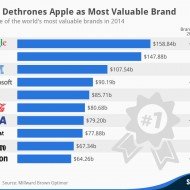Posted by Managementguru in Business Ethics, Change management, CSR, Marketing
on Jan 11th, 2015 | 0 comments

Consumer Loyalty Is Driven By ‘#Trust’ One of my most favorite things to say is that people hire brands that they know, like, and trust. Think about it. How do you feel about your insurance man, or the guy who sold you your last car? In all of our lives, there is a salesman that we feel connected to, or a brand that is familiar to us. Making a purchase isn’t just something that we do, it is something that we experience. Managing Brand Equity: Capitalizing on the Value of a Brand Name When it comes to business and sales, we start to look at things from a different perspective. How do we get our customers to know, like, and trust us? In a recent report, Havas Media ranked the world’s most meaningful brands. Topping the list were companies like IKEA, Google, #Nestle, Danone, Leroy-Merlin, Samsung, Microsoft, Sony, and Unilever. Major brands to be sure, but what is it exactly that makes them so meaningful? Which brands ranked the highest? Ikea Google Nestle Danone Leroy-Merlin Samsung Microsoft Sony Unilever Bimbo Garrett Moon 90% of Americans more likely to trust brands that back #social causes If your brand doesn’t support social causes, it’s missing out on a huge audience. Consumers don’t just like when companies incorporate social good into their business models — they’ve come to expect it, whether it’s through #corporate social responsibility (CSR), cause marketing or “good” content. In fact, 90% of Americans say they’re more likely to trust and stay loyal to companies that actively try to make a difference. #Customer Loyalty: How to Earn It, How to Keep It Studies also show that 88% of consumers would buy a product with a social or environmental benefit, and a surprising 84% would tell friends and family about a company’s CSR efforts. Brands can tap into this consumer base through original content and social media. After all, 64% of millennials use social media to address companies about social and environmental issues, and 36% of consumers say they mainly share content to promote the causes they care about. But your company needs to be genuine. Don’t underestimate your consumers’ intelligence by simply jumping on this bandwagon. “Causewashing” is a serious issue, and odds are your consumers will smell it a mile away. Matt Petronzio Google Beats Apple Apple is out, Google is in. Google has usurped Apple—leader for three years in a row—on the 2014 BrandZ Top 100 Most Valuable Global Brand ranking, out today. It has grown 40 percent since last year and has a #brand value of $159 billion. So why and how did Google bump Apple? “It’s a story about two hugely #successful technology companies,” said Oscar Yuan, VP at Millward Brown Optimor. “Apple’s been known for earth-shattering, category-creating, revolutionary products. And I would say just recently Apple’s innovations have been more evolutionary than revolutionary. I think that may have played a little bit in the drop from first to second,” he said. “Google has been doing just the opposite—they’ve been organizing the world’s information and putting it at your fingertips. Even to things as aggressive as GoogleX—they are making WiFi available globally by putting satellites tied to balloons over the earth. [That kind of innovation] does enormous things for the brand—it’s seen as a making-dreams-come-true-type company, and that certainly helps their brand value,” Yuan said. Jennifer Rooney Related Posts: CSR How to Build Brand Value of Businesses? Does Your Company Have What it Takes to be a...


